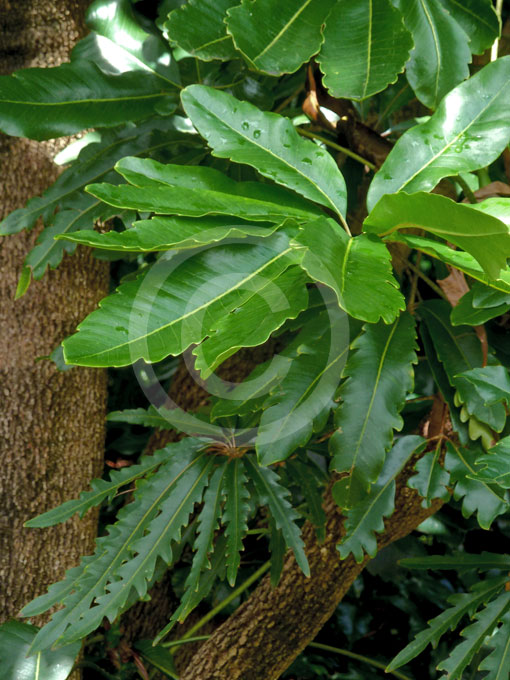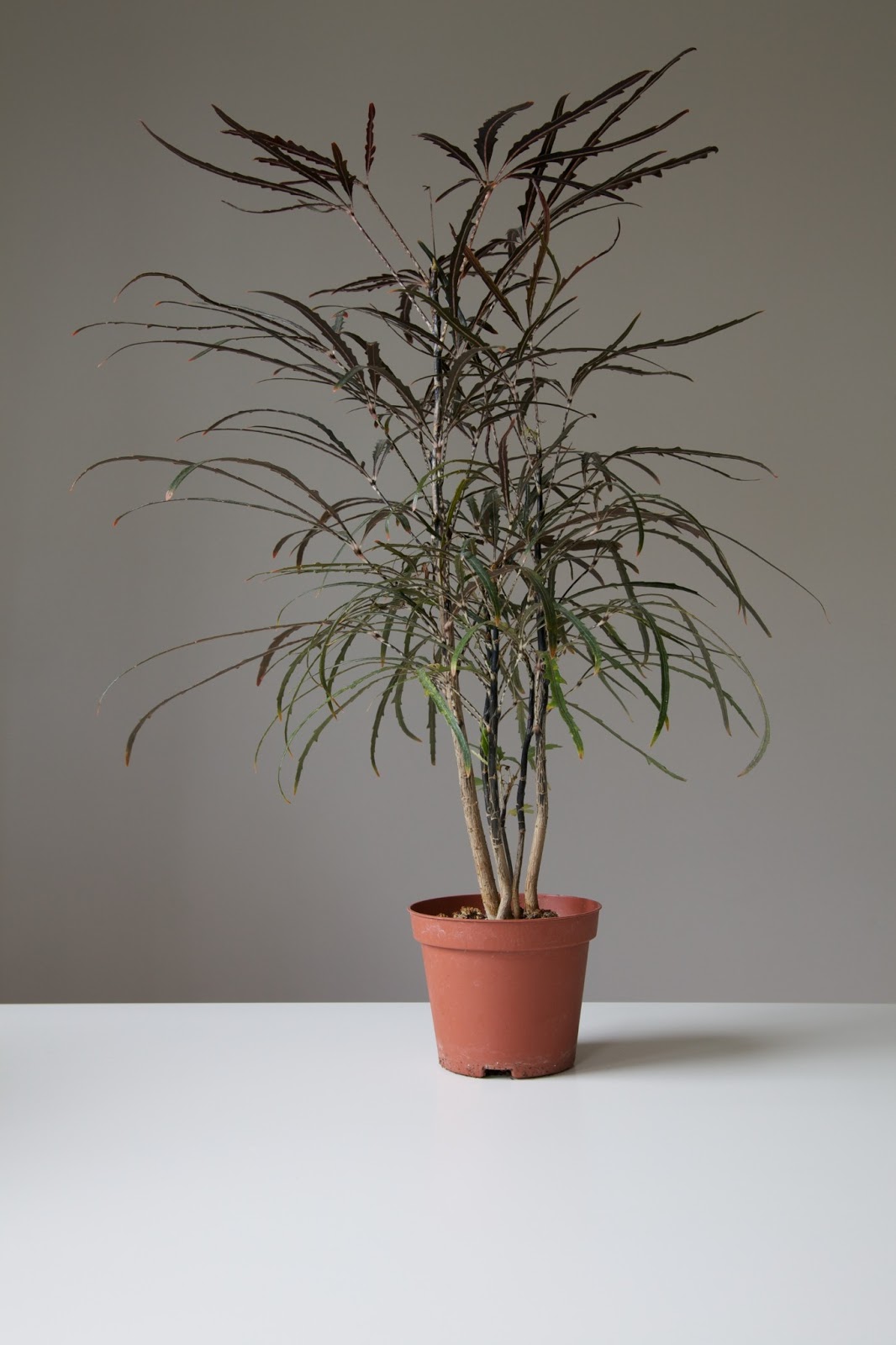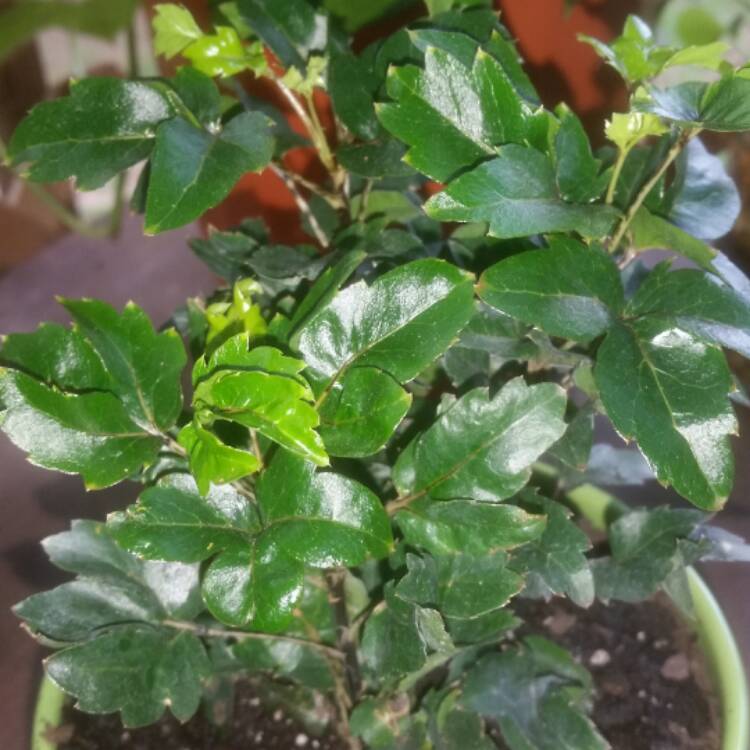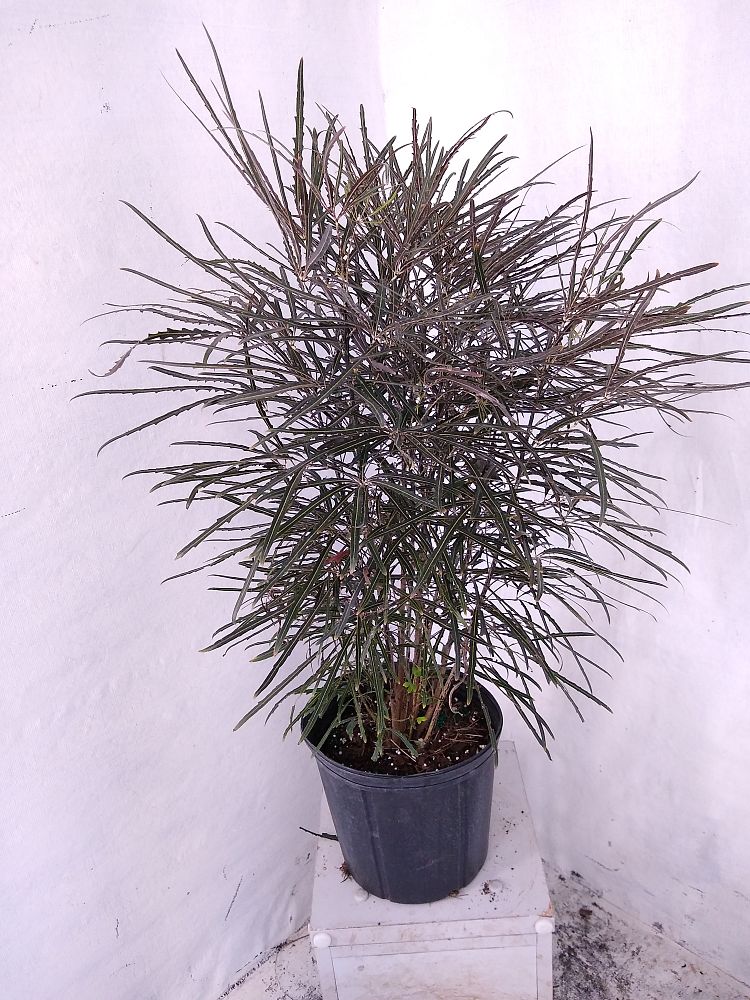
Schefflera elegantissima False Aralia information & photos
Plerandra elegantissima (formerly called Schefflera elegantissima and Dizygotheca elegantissima ), the false aralia, is a species of flowering plant in the family Araliaceae, native to New Caledonia. [2] Description Growing to 8-15 m (26-49 ft) tall by 2 m (7 ft) broad, it is an evergreen shrub or tree.

Buy Schefflera Elegantissima, False Aralia Free Shipping over 100
The False Aralia is a Pacific Island native plant. Schefflera Elegantissima usually grow as tall as six feet when raised indoors. Low temperatures will cause the leaves to wilt and fall off of this plant. False Aralia The False Aralia Features: An Overview A common name for the False Aralia is the Finger Aralia

Schefflera elegantissima, falsa Aralia Plantas y Jardín
What is false aralia? This plant has long, thin leaves with a jagged sawtooth edge. The leaves come in bright green but turn a dark green, almost black, with age. Other names for false aralia include: Dizygotheca elegantissima Plerandra elegantissima Schefflera elegantissima spider aralia threadleaf aralia finger aralia plant Types of False Aralia

my gardening archive false aralia
Noteworthy Characteristics. Schefflera elegantissima, commonly called false aralia, is native to rainforests in New Caledonia where it grows as a shrub or small tree to 50' tall.It is widely grown in temperate climates as a much smaller ornamental houseplant. Indoors it is typically grown as a small juvenile plant (to 3' tall) or as a mature plant (to 6-8' tall).

Schefflera elegantissima 'Olympia' Syn. Dizygotheca elegantissima
S. elegantissima is a sparsely-branched, erect shrub to 3m or more, with leaves to 30cm in length, composed of radiating, narrow, toothed, dark bronze-green leaflets, becoming broader on adult plants Other common names petit boux caledonien threadleaf false aralia see more spider plant Synonyms Dizygotheca elegantissima Schefflera elegantissima

PlantFiles Pictures False Aralia (Schefflera elegantissima) by gingern
Water the plant when it dries a few centimeters from the soil surface. Do not forget that to provide the moisture needed by the plant, you must regularly spray water on the surface of the leaves. And after watering the Plerandra Elegantissima (False Aralia), immediately drain the water collected under the pot.

Photo of the entire plant of False Aralia (Schefflera elegantissima
False Aralias are only hardy in USDA zones 11-12. In other areas, they are grown as house plants. In the garden, Schefflera elegantissima should be grown in partial to full shade where they will be protected from the wind.They should be planted in slightly acidic, well drained but moisture retentive soil with a pH of 5.5 to 6.5 .

Buy Schefflera Elegantissima, False Aralia Free Shipping over 100
A False Aralia, native to New Caledonia, has many different names depending who you ask: Dizygothica elegantissima, Schefflera Elegantissima, or Spider Aralia. Whatever you call it, this is a beautiful plant with long, narrow, serrated leaves in a palmate (finger-like) arrangement.

PlantFiles Pictures Schefflera Species, False Aralia (Schefflera
Minimum cold hardiness: Zone 11 +4.4 °C (40 °F) to +7.2 °C (50 °F) Maximum recommended zone: Zone 12. Plant Height: 4 - 6 feet. Leaves: Unusual foliage color. Evergreen.

PlantFiles Pictures False Aralia (Schefflera elegantissima) by katrinas
An immensely popular houseplant, false aralia ( Plerandra elegantissima) has beautifully textured foliage with deeply serrated leaflets that start out a copper or burgundy shade and eventually deepen to a rich green. The juvenile plants tend to have more textured foliage while the adult leaves are more deeply lobed.

Buy Schefflera Elegantissima, False Aralia Free Shipping over 100
Schefflera actinophylla, also known as the Australian umbrella tree, is one of the two schefflera species that are common houseplants. It has large leaflets up to 10 inches long.. False Aralia . Dean Schoeppner. Schefflera elegantissima is indeed an elegant plant with its narrow, saw-tooth-edge green leaves and lean, upright plant form.

Schefflera Elegantissima, False Aralia PlantVine
Schefflera elegantissima, also known as the "Variegated Umbrella Tree," is a tropical plant native to Australia and New Guinea that is known for its glossy, green leaves with distinctive white or yellow variegation. It is often grown as an ornamental plant in outdoor gardens or as a houseplant, and it requires bright indirect light and regular watering to thrive.
:max_bytes(150000):strip_icc()/FalseAralia-4505272359_fe01e7bb09_o-59c08200519de20010284198.jpg)
False Aralia Growing Schefflera Elegantissima Indoors
It looks like a false aralia (Schefflera elegantissima). Over the years plant experts have given this plant several different names, among them are: spider aralia and thread leaf aralia. It even has another scientific name: Dizygotheca elegantissima. Here are some care tips. Light: Medium to bright indirect light, no direct sun

Schefflera Elegantissima, False Aralia PlantVine
Info Synonym Aralia elegantissima Dizygotheca elegantissima Dizygotheca faguetii Plerandra elegantissima Schefflera faguetii Sun Exposure Sun to Partial Shade Foliage Evergreen Height 30-40 ft. (9-12 m) over 40 ft. (12 m) Spacing 24-36 in. (60-90 cm) Hardiness USDA Zone 11: above 4.5 °C (40 °F) Danger Unknown - Tell us Bloom Color Pale Yellow

Schefflera Elegantissima, False Aralia PlantVine
False Aralia Care Tips. Height: This Pacific Island native can grow to 20 ft (6 m) in the wild, but indoors this tree will slowly reach about 6 ft (1.8 m). Light: For a lush, bushy plant, give False Aralia plenty of bright light, but no direct sun. Too much sun exposure may cause leaf edges to turn brown.

Farm Life Nursery on Instagram “14" Schefflera elegantissima 'False
It is a smaller version of the Schefflera actinophylla which makes it perfect for indoor spaces. When planted in a larger container, this variety of Aralia can grow to be 5 feet tall.. Galaxy False Aralia (P. elegantissima 'Galaxy') This variety of False Aralia boasts shinier leaves than others. The foliage also tends to be a much darker.